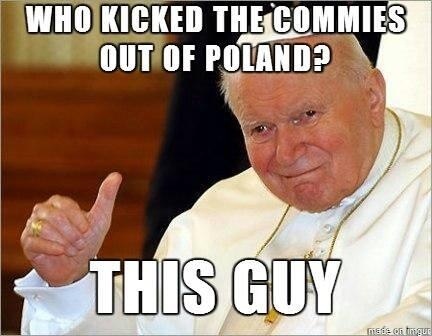From my initial list of topics for Evangelii Gaudium, I’m down to one major theme, two minor themes, and some extra stuff that I probably won’t get to. I’ve got some travel coming, and I’m trying to learn Italian, and I’m betting Francis will have an encyclical on the environment out sooner than later, so I will leave it with these last three.
This is not a major theme, not an overt one, but given the whole “Four Popes Sunday” last weekend, I thought it was worth pointing out now that Francis’ writing, like other things he’s done, betrays a sometimes subtle but thoroughly radical devolution of power that I’m not sure any previous pope has displayed. (Though I’m sure a real Church historian could come up with some contenders.)
First of all, and you have to actually read the document to pick this up, because I didn’t make a complete list, Francis puts a lot of credibility in his fellow bishops. Most papal documents I’ve read cite preceding popes HEAVILY. Some draw on the catechism, or the Doctors of the Church, or a Vatican Council. Now, maybe an apostolic exhortation is a different beast than the encyclicals I read, but it was striking how many different times Francis cites pronouncements by bishops. And from everywhere! Canada, Mexico, Latin America, Brazil, Africa, Oceania, Philippines, France. I think he cites bishops in Haiti once, even. This is not a vicar-of-Christ approach to papal authority; this is a first-among-equals approach. That’s significant. When he famously said, “Who am I to judge?” I think he meant it.
And he says as much: “Nor do I believe that the papal magisterium should be expected to offer a definitive or complete word on every question that affects the Church and the world. It is not advisable for the Pope to take the place of local Bishops in the discernment of every issue which arises in their territory. In this sense, I am conscious of the need to promote a sound “decentralization.” (16)
This works its way down. In 31, Francis posits that bishops will look for ways to encourage participation “out of a desire to listen to everyone and not simply to those who would tell him what he would like to hear.” This applies to him, even: “It is my duty, as the Bishop of Rome, to be open to suggestions which can help make the exercise of my ministry more faithful to the meaning which Jesus Christ wished to give it and to the present needs of evangelization.” (32) In fact, 32 is one long confession that Vatican II hasn’t been effective in reforming the papacy by making it more collegial and less hierarchical.
In 51, Francis admits “It is not the task of the Pope to offer a detailed and complete analysis of contemporary reality”; it’s hard to imagine John Paul II, or Benedict XVI, or even Paul VI or John XXIII conceding that point.
In 104, as Francis rules out the ordination of women, he offers this important qualification: reserving priesthood for men “can prove especially divisive if sacramental power is too closely identified with power in general…The ministerial priesthood is one means employed by Jesus for the service of his people, yet our great dignity derives from baptism, which is accessible to all. The configuration of the priest to Christ the head…does not imply an exaltation which would set him above others.”
He later (106) identifies the need to better engage young people in leadership. Also the elderly (108).
Finally, this; “neither the Pope nor the Church have a monopoly on the interpretation of social realities or the proposal of solutions to contemporary problems.” (184)
If you’re looking for a Pope who has all the answers and all the powers, Francis isn’t your guy.
(Pope Saint John Paul II didn’t really say this.) (But Francis never would.)


Leave a comment